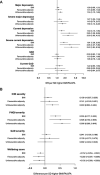Higher adiposity and mental health: causal inference using Mendelian randomization
- PMID: 34270736
- PMCID: PMC8643500
- DOI: 10.1093/hmg/ddab204
Higher adiposity and mental health: causal inference using Mendelian randomization
Abstract
Higher adiposity is an established risk factor for psychiatric diseases including depression and anxiety. The associations between adiposity and depression may be explained by the metabolic consequences and/or by the psychosocial impact of higher adiposity. We performed one- and two- sample Mendelian randomization (MR) in up to 145 668 European participants from the UK Biobank to test for a causal effect of higher adiposity on 10 well-validated mental health and well-being outcomes derived using the Mental Health Questionnaire (MHQ). We used three sets of adiposity genetic instruments: (a) a set of 72 BMI genetic variants, (b) a set of 36 favourable adiposity variants and (c) a set of 38 unfavourable adiposity variants. We additionally tested causal relationships (1) in men and women separately, (2) in a subset of individuals not taking antidepressants and (3) in non-linear MR models. Two-sample MR provided evidence that a genetically determined one standard deviation (1-SD) higher BMI (4.6 kg/m2) was associated with higher odds of current depression [OR: 1.50, 95%CI: 1.15, 1.95] and lower well-being [ß: -0.15, 95%CI: -0.26, -0.04]. Findings were similar when using the metabolically favourable and unfavourable adiposity variants, with higher adiposity associated with higher odds of depression and lower well-being scores. Our study provides further evidence that higher BMI causes higher odds of depression and lowers well-being. Using genetics to separate out metabolic and psychosocial effects, our study suggests that in the absence of adverse metabolic effects higher adiposity remains causal to depression and lowers well-being.
© The Author(s) 2021. Published by Oxford University Press.
Figures


Similar articles
-
Adiposity and cancer: a Mendelian randomization analysis in the UK biobank.Int J Obes (Lond). 2021 Dec;45(12):2657-2665. doi: 10.1038/s41366-021-00942-y. Epub 2021 Aug 27. Int J Obes (Lond). 2021. PMID: 34453097
-
Childhood, adolescent, and adulthood adiposity are associated with risk of PCOS: a Mendelian randomization study with meta-analysis.Hum Reprod. 2023 Jun 1;38(6):1168-1182. doi: 10.1093/humrep/dead053. Hum Reprod. 2023. PMID: 37015099 Free PMC article.
-
Adiposity, metabolites, and colorectal cancer risk: Mendelian randomization study.BMC Med. 2020 Dec 17;18(1):396. doi: 10.1186/s12916-020-01855-9. BMC Med. 2020. PMID: 33327948 Free PMC article.
-
Using Mendelian randomization to investigate a possible causal relationship between adiposity and increased bone mineral density at different skeletal sites in children.Int J Epidemiol. 2016 Oct;45(5):1560-1572. doi: 10.1093/ije/dyw079. Epub 2016 May 22. Int J Epidemiol. 2016. PMID: 27215616 Free PMC article.
-
Association between adiposity and cardiovascular outcomes: an umbrella review and meta-analysis of observational and Mendelian randomization studies.Eur Heart J. 2021 Sep 7;42(34):3388-3403. doi: 10.1093/eurheartj/ehab454. Eur Heart J. 2021. PMID: 34333589 Free PMC article.
Cited by
-
Association between visceral adiposity and generalized anxiety disorder (GAD).BMC Psychol. 2024 Jan 25;12(1):49. doi: 10.1186/s40359-024-01542-x. BMC Psychol. 2024. PMID: 38273394 Free PMC article.
-
Effects of physical activity and sedentary time on depression, anxiety and well-being: a bidirectional Mendelian randomisation study.BMC Med. 2023 Dec 18;21(1):501. doi: 10.1186/s12916-023-03211-z. BMC Med. 2023. PMID: 38110912 Free PMC article.
-
Identifying high-risk population of depression: association between metabolic syndrome and depression using a health checkup and claims database.Sci Rep. 2022 Nov 3;12(1):18577. doi: 10.1038/s41598-022-22048-9. Sci Rep. 2022. PMID: 36329095 Free PMC article.
-
Bidirectional two-sample Mendelian randomization analysis identifies causal associations between relative carbohydrate intake and depression.Nat Hum Behav. 2022 Nov;6(11):1569-1576. doi: 10.1038/s41562-022-01412-9. Epub 2022 Jul 18. Nat Hum Behav. 2022. PMID: 35851841
-
Physical Activity and Long-Term Risk of Breast Cancer, Associations with Time in Life and Body Composition in the Prospective Malmö Diet and Cancer Study.Cancers (Basel). 2022 Apr 13;14(8):1960. doi: 10.3390/cancers14081960. Cancers (Basel). 2022. PMID: 35454864 Free PMC article.
References
-
- Onyike, C.U., Crum, R.M., Lee, H.B., Lyketsos, C.G. and Eaton, W.W. (2003) Is obesity associated with major depression? Results from the Third National Health and Nutrition Examination Survey. Am. J. Epidemiol., 158, 1139–1147. - PubMed
-
- Scott, K.M., McGee, M.A., Wells, J.E. and Oakley Browne, M.A. (2008) Obesity and mental disorders in the adult general population. J. Psychosom. Res., 64, 97–105. - PubMed
-
- Gariepy, G., Nitka, D. and Schmitz, N. (2010) The association between obesity and anxiety disorders in the population: a systematic review and meta-analysis. Int. J. Obes., 34, 407–419. - PubMed
-
- McCrea, R.L., Berger, Y.G. and King, M.B. (2012) Body mass index and common mental disorders: exploring the shape of the association and its moderation by age, gender and education. Int. J. Obes., 36, 414–421. - PubMed
-
- Blaine, B. (2008) Does depression cause obesity?: a meta-analysis of longitudinal studies of depression and weight control. J. Health Psychol., 13, 1190–1197. - PubMed

